There’s an old saying that I’m certain you’ve heard before: “May you live in interesting times.”
The phrase is a translation of a Chinese curse, because peace, harmony, all those niceties make for a dull existence. War, unrest, injustice—now that makes for interesting times. It’s like Orson Wells said in his famous speech in Carol Reed’s classic film The Third Man:
In Italy, for thirty years under the Borgias, they had warfare, terror, murder and bloodshed, but they produced Michelangelo, Leonardo da Vinci and the Renaissance. In Switzerland, they had brotherly love, they had five hundred years of democracy and peace—and what did that produce? The cuckoo clock.
If that holds true, then boy oh boy are we living in interesting times.
Not that this is something to boast about. It’s not. Luckily, though, we have many tools of resistance at our fingertips, tools that help us fight back against the injustices of our time. The first step to resisting, though, is knowing there’s a problem to begin with (or, perhaps more accurately, believing there’s a problem). And one of the greatest weapons we have against misinformation, intolerance, lack of awareness, all of it, is fiction. If you ask me, stories are the most powerful thing we possess; they have the power to change hearts and minds—I believe that with every fiber of my being.
See, here’s the thing: I grew up on the South Side of Chicago in the 1980s, and it wasn’t exactly a cradle of tolerance. Luckily, I had parents who preached love and acceptance, and the example they set helped open my mind. But, your parents can only take you so far. Especially when you’re a teenager and parents are totally uncool. It was during that time—my teenage years—that my worldview was cracked open like a Fabergé egg. And this happened because my English teach, Mr. Croc, handed me a copy of Kurt Vonnegut’s Sirens of Titan and changed my world forever. Mr. Croc—who happened to be color blind, like me, and wore the most awesome combos of yellow, green, and red ties, shirts, and jackets—introduced me to the world of science fiction, and I’ve never looked back.
Nothing was more formative to me than the lessons I learned from writers like Vonnegut, Bradbury, Huxley, and Le Guin. These people—whom I never met—shaped my views on politics, justice, equality, and so much more. It’s been said before, but sci-fi possesses the unique ability to instruct and inform, to subtly—or, at times, not-so-subtly—act as a warning of what happens to worlds overrun with inequality, with war, and with hate. These books may seem like they’re talking about times and places far, far away, but that’s their magic. They’re talking about us. Right here, right now. And their messages remain true and profound across generations, ready to come to the aid of us people lucky enough to be living in “interesting times.”
With that in mind, here’s a glimpse of some books that, to me, contain a unique power in their words, whether they were written last year or a half century ago:
The Word for World is Forest by Ursula Le Guin
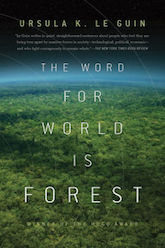 While Le Guin has written many books that could make this list, I’ve always contended that Forest deserves so much more attention. A funny, humane, heartbreaking story about colonialism, the novel chronicles an invading military’s encounter with a peaceful, alien race. Told through the perspective of a bumbling military captain, the book chronicles the escalating tensions between the humans and the alien Athsheans and ends up being a powerful anti-military statement (amongst other things).
While Le Guin has written many books that could make this list, I’ve always contended that Forest deserves so much more attention. A funny, humane, heartbreaking story about colonialism, the novel chronicles an invading military’s encounter with a peaceful, alien race. Told through the perspective of a bumbling military captain, the book chronicles the escalating tensions between the humans and the alien Athsheans and ends up being a powerful anti-military statement (amongst other things).
American War by Omar El Akkad
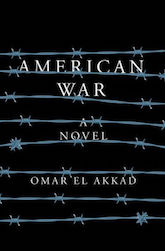 Let me just be clear about something: This book scared the shit out of me. But in the best way possible. In a nutshell, American War takes place in a future where America is fighting its second civil war, and that’s only the tip of the iceberg when it comes to how grim things are in El Akkad’s brilliant novel. There’s drones, there’s ecological disaster, and so much more, but what’s most powerful—and most terrifying—is seeing the nightmare that discord has wrought. It should be almost unimaginable; America is killing itself by waging war against itself, and the horrifying thing is that it feels so remarkably real.
Let me just be clear about something: This book scared the shit out of me. But in the best way possible. In a nutshell, American War takes place in a future where America is fighting its second civil war, and that’s only the tip of the iceberg when it comes to how grim things are in El Akkad’s brilliant novel. There’s drones, there’s ecological disaster, and so much more, but what’s most powerful—and most terrifying—is seeing the nightmare that discord has wrought. It should be almost unimaginable; America is killing itself by waging war against itself, and the horrifying thing is that it feels so remarkably real.
Fahrenheit 451 by Ray Bradbury
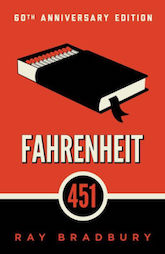 Unfortunately, censorship has become a crisis in recent years, thanks to the current penchant for dismissing adverse opinion and facts as “fake news.” Fahrenheit 451 is one of the seminal works on censorship and dystopias, but it’s also one that tends to be misread in its message. Yes, it absolutely condemns the effects of censorship—but it also provides an invasive look at the conditions in which censorship arises. In the world of Fahrenheit 451, censorship begins when the world starts eliminating texts that makes people uncomfortable, which is a statement on the necessity of important, powerful texts: Sometimes, you need to feel uncomfortable. Sometimes, the path to truth is an uneasy one. And once you open the door to any censorship—and this goes for people shouting fake news as much as those guilty of open bigotry/noxious rhetoric—Fahrenheit 451 posits, you risk opening the door to deeper and more troubling censorship. An important lesson for our time indeed.
Unfortunately, censorship has become a crisis in recent years, thanks to the current penchant for dismissing adverse opinion and facts as “fake news.” Fahrenheit 451 is one of the seminal works on censorship and dystopias, but it’s also one that tends to be misread in its message. Yes, it absolutely condemns the effects of censorship—but it also provides an invasive look at the conditions in which censorship arises. In the world of Fahrenheit 451, censorship begins when the world starts eliminating texts that makes people uncomfortable, which is a statement on the necessity of important, powerful texts: Sometimes, you need to feel uncomfortable. Sometimes, the path to truth is an uneasy one. And once you open the door to any censorship—and this goes for people shouting fake news as much as those guilty of open bigotry/noxious rhetoric—Fahrenheit 451 posits, you risk opening the door to deeper and more troubling censorship. An important lesson for our time indeed.
Parable of the Sower by Octavia Butler
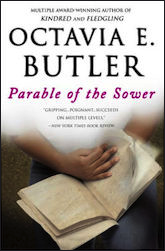 Again, there are so many Butler books that are worthy of inclusion in the list, and there are similarly so many themes in her powerful seminal Earthseed story. Personally, I’ve always loved the way Butler approaches the power of community (something that I touch on in my own novel, Black Star Renegades); in Parable, Butler beautifully weaves into her rich story the power of unity and how we’re all stronger, and better, when we’re not only working together, but also living in conditions that foster respect and dignity to all people.
Again, there are so many Butler books that are worthy of inclusion in the list, and there are similarly so many themes in her powerful seminal Earthseed story. Personally, I’ve always loved the way Butler approaches the power of community (something that I touch on in my own novel, Black Star Renegades); in Parable, Butler beautifully weaves into her rich story the power of unity and how we’re all stronger, and better, when we’re not only working together, but also living in conditions that foster respect and dignity to all people.
Autonomous by Annalee Newitz
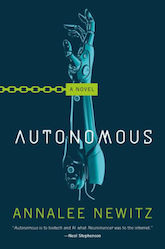 The debut novel from io9 co-founder Newitz chronicles a world profoundly impacted by climate change. Couched as a tech thriller, Autonomous adroitly examines many issues that are so very salient to our times: identity, artificial intelligence, sexuality, and much more, all cast against a world radically altered by climate change and how, specifically, it has altered human health. It’s a powerful, gripping, and scary tale, but definitely an essential one.
The debut novel from io9 co-founder Newitz chronicles a world profoundly impacted by climate change. Couched as a tech thriller, Autonomous adroitly examines many issues that are so very salient to our times: identity, artificial intelligence, sexuality, and much more, all cast against a world radically altered by climate change and how, specifically, it has altered human health. It’s a powerful, gripping, and scary tale, but definitely an essential one.
 Michael Moreci is a comics writer and novelist best known for his sci-fi trilogy Roche Limit. His debut novel, Black Star Renegades, is available now. Follow him on Twitter @MichaelMoreci.
Michael Moreci is a comics writer and novelist best known for his sci-fi trilogy Roche Limit. His debut novel, Black Star Renegades, is available now. Follow him on Twitter @MichaelMoreci.










